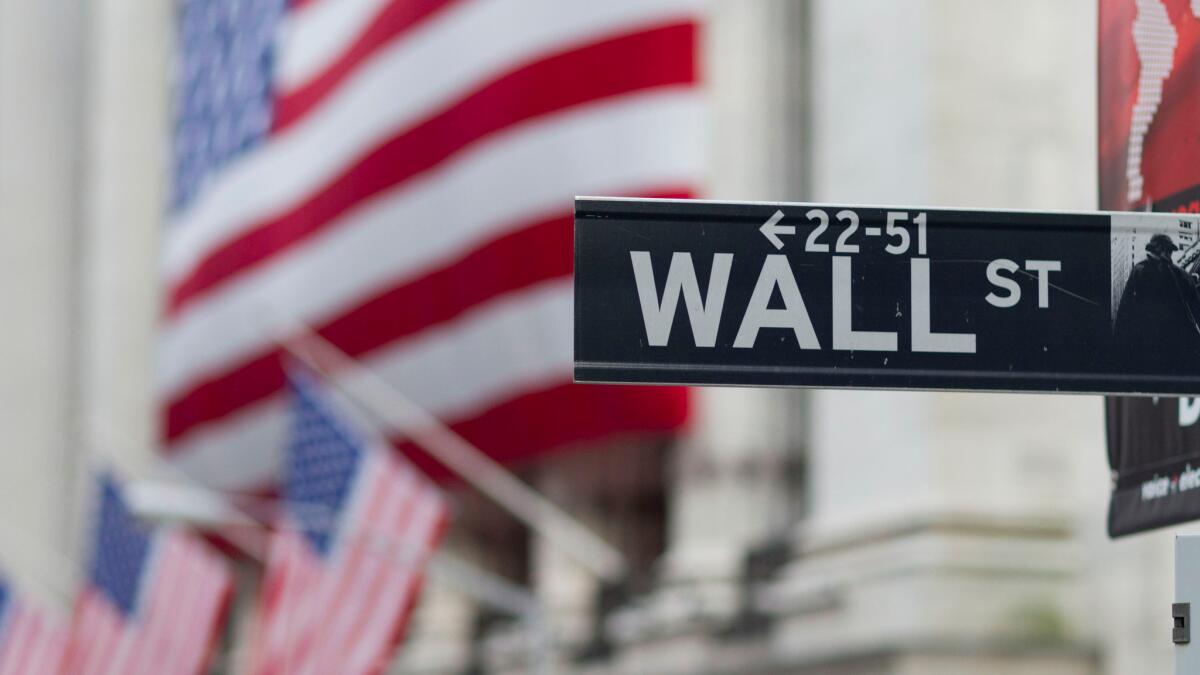Tech stocks tumble; Facebook, Netflix and Nvidia drop 4.5% or more

- Share via
Technology stocks slammed into reverse Monday, and the losses overshadowed gains in other areas of the market, sending broad U.S. indexes down.
Treasury bond prices and gold rose, meanwhile, as investors looked for safer places for their money after the latest escalation in the heated rhetoric between the United States and North Korea. Stock markets around the world were mixed after German Chancellor Angela Merkel, the leader of Europe’s largest economy, retained her position, though her political strength may have weakened.
The Standard & Poor’s 500 index fell 5.56 points, or 0.2%, to 2,496.66. The Dow Jones industrial average fell 53.50 points, or 0.2%, to 22,296.09, and the Nasdaq composite dropped 56.33 points, or 0.9%, to 6,370.59. Smaller stocks held up better than the rest of the market, and the small-cap Russell 2000 index edged up 1.18 points, or 0.1%, to 1,451.96.
The day’s action was centered around the technology sector, and tech stocks in the S&P 500 lost 1.4%. That’s more than three times the loss of any of the other 10 sectors that make up the index, and the losses were broad: Facebook and Nvidia both sank 4.5%, and video-game developer Electronic Arts lost 3.6%.
Any stumble for tech this year has been notable given how much better that sector has done than the rest of the market. Tech stocks in the S&P 500 have jumped 23% in 2017, double the overall S&P 500’s gain. They’ve been so successful that many hedge funds and other investors have bought them in hopes of riding the tide higher. But tech stocks’ success also means those stocks look more expensive than the rest of the market, relative to corporate profits.
Netflix also fell Monday, dropping 4.7% to $178.55. It’s still up more than 44% this year.
“There have been a lot of dollars trafficking in these areas that have been winners the last year or so,” said Nate Thooft, senior portfolio manager at Manulife Asset Management. “As people get scared — as they see better opportunities elsewhere, or as they see someone else heading for the gates — it’s a bit of a self-fulfilling prophecy,” he said, where investors look to sell their tech stocks before everyone else does.
On Monday, some money flowed into areas of the market that hadn’t done as well.
Energy stocks, which have been the worst performers in the S&P 500 this year, had the day’s strongest gains. Marathon Oil gained 3.1%, for example, and Noble Energy rose 2.7%.
Those stocks rose with the price of oil, which has been holding above $50 a barrel in recent days after spending most of the summer below that level. Benchmark U.S. crude rose $1.56 on Monday to settle at $52.22. Brent crude, the international standard, jumped $2.16 to $59.02 a barrel.
Genuine Parts had the biggest gain in the S&P 500. It climbed 6% to $93.22 after it said it would buy Alliance Automotive Group, a European distributor of auto parts, tools and workshop equipment. Genuine Parts valued the deal at $2 billion, including debt.
The stock market has been remarkably placid for much of this year, and the biggest move for the S&P 500 last week was a dip of just 0.3%. A few events are on the schedule for this week, though, which could make markets more active.
Federal Reserve Chairwoman Janet L. Yellen will give a speech on inflation and monetary policy Tuesday. She is one of several central bankers on the schedule for the week. Investors are also waiting to hear more details about President Trump’s plans to cut taxes.
Investors were also keeping a close eye on tensions between North Korea and the U.S. On Monday, North Korea’s foreign minister said Trump’s threat over the weekend that leader Kim Jong Un may not be “around much longer” was a declaration of war.
Prices for Treasury bonds jumped after North Korea’s foreign minister made his comments. That in turn pushed down yields.
The yield on the 10-year Treasury note fell to 2.21% from 2.25%. The two-year fell to 1.41% from 1.44%, and the 30-year fell to 2.76% from 2.78%.
The price of gold was down in morning trading, but it quickly reversed course after the North Korean statement. It rose $14 to $1,311.50 an ounce.
Silver rose 16 cents to $17.15 an ounce, and copper fell a penny to $2.94 a pound.
Natural gas fell 4 cents to $2.92 per 1,000 cubic feet. Heating oil rose 4 cents to $1.86 a gallon. Wholesale gasoline rose 5 cents to $1.72 a gallon.
In overseas markets, Germany’s DAX index was virtually flat after Merkel won a fourth term as the nation’s chancellor. Her party and its allies, though, lost some seats as they turned in one of their weakest postwar results. The results sent the euro lower and underscored the challenge Merkel has in forming a coalition with new partners to lead Europe’s biggest economy.
The CAC 40 fell 0.3% in Paris, and the FTSE 100 slipped 0.1% in London.
In Asia, Japan’s Nikkei 225 rose 0.5%, South Korea’s Kospi fell 0.3% and Hong Kong’s Hang Seng declined 1.4%.
The euro fell to $1.1846 from $1.1941. The British pound fell to $1.3470 from $1.3527. The dollar fell to 111.61 yen from 112.05 yen.
UPDATES:
2:30 p.m.: This article was updated with closing prices, context and analyst comment.
1:20 p.m.: This article was updated with the close of markets.
7:40 a.m.: This article was updated with market prices and context.
This article was originally published at 6:55 a.m.
More to Read
Inside the business of entertainment
The Wide Shot brings you news, analysis and insights on everything from streaming wars to production — and what it all means for the future.
You may occasionally receive promotional content from the Los Angeles Times.










